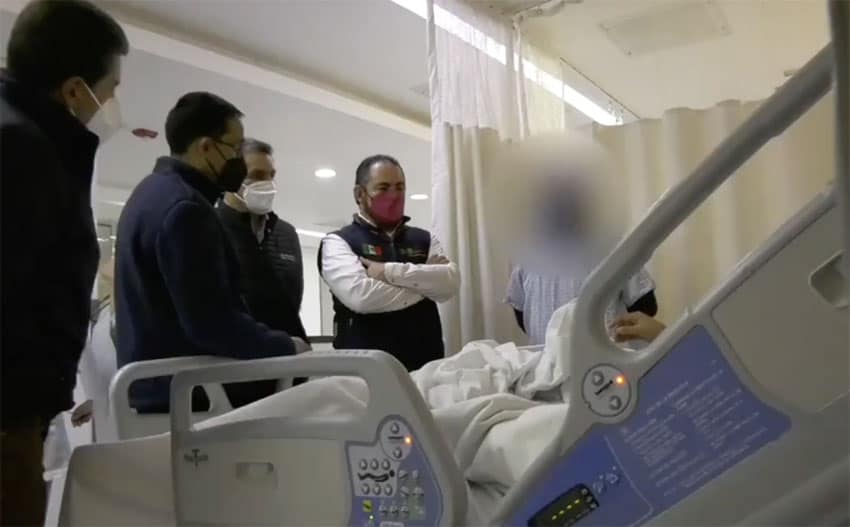A mysterious outbreak of meningitis has now claimed the lives of nine women and one man in the northern state of Durango.
The state Health Ministry reported Wednesday that 61 cases of the infection had been confirmed and that 10 people had died. The infections, which have been identified as fungal meningitis, were all detected in Durango city.
Most infections occurred in women who were pregnant and underwent surgeries such as cesarean sections in recent months, according to a report by the news website Animal Político. However, the newspaper El Financiero reported that the most recent death was that of a 47-year-old man who had surgery on a fractured leg in September. He was the first male to die during the current outbreak of meningitis, an infection of the protective membranes that surround the brain and spinal cord.
The cause of the Durango outbreak hasn’t been established, but two medical specialists who spoke with Animal Político suggested that tainted counterfeit medicine or contaminated hypodermic needles could be to blame.
Based on the available information, the chief suspect would appear to be contaminated bupivacaine, an anesthetic that can be used to relieve pain during child birth.
Animal Político reported that all the women who contracted meningitis had had epidurals. Most gave birth in private hospitals, and were discharged before subsequently being readmitted to hospital when they fell ill with meningitis.
Supporting the hypothesis that contaminated bupivacaine is behind the outbreak is the fact that on Nov. 10 the health regulator Cofepris ordered the withdrawal of four batches of the anesthetic manufactured by Mexican pharmaceutical company PiSA as a preventative measure while an investigation into the cause of the meningitis cases took place. The warning applied to almost 250,000 vials of the medication.
On Nov. 7, a Durango health official also issued a warning against the use of PiSA-manufactured bupivacaine due to cases of “adverse reactions” following use of the drug.

However, an infectious disease specialist who spoke with Animal Político believes it’s unlikely that the bupivacaine manufactured by PiSA was contaminated. Alejandro Macías instead raised the possibility that a contaminated counterfeit version of the anesthetic has been used in Durango.
If the PiSA bupivacaine was contaminated, there would have been a larger meningitis outbreak as the medication was distributed widely, including in several foreign countries, Macías said. If PiSA’s four batches were contaminated, there would have been hundreds of thousands of meningitis cases, he said. However, the outbreak has been limited to Durango city, a situation that led Macías to formulate his counterfeit medicine hypothesis.
On Nov. 15, the federal Health Ministry said in a statement that a group of its experts was working with Durango authorities to determine the cause of the meningitis outbreak. It hasn’t provided an update since then.
The Health Ministry noted that 49 cases and six deaths had been reported by Nov. 14, meaning that an additional 12 cases and four deaths have been confirmed in the last nine days, despite the withdrawal of the suspect batches of bupivacaine. Macías and Isaac Chávez Díaz — another doctor who spoke with Animal Político — said that meningitis symptoms, among which are headache, fever and a stiff neck, can appear weeks after infection.

As part of the investigation into the meningitis outbreak, health authorities inspected health care facilities in Durango and subsequently shut down one private hospital and two operating rooms of another private hospital “due to critical irregularities,” the Health Ministry said.
Chávez Díaz, a National Autonomous University-trained anesthesiologist, told Animal Político that the meningitis mortality rate is high even though patients in Durango have been treated with antifungal medications because “it’s a very serious illness.”
He said that contaminated needles could be the cause of the meningitis outbreak, but admitted that his hypothesis is difficult to corroborate. Chávez said that disposable syringe needles could have been used on more than one occasion after being subjected to an unsuccessful sterilization process.
He and Macías said that definitively establishing the cause of the meningitis outbreak in Durango will take time and money. “It’s not a 100-meter sprint, it’s a marathon,” Macías said.
One of the women who died after becoming ill with meningitis was Alejandra Rojas’ sister, Maleny. Rojas wrote on Facebook this week that her sister died after being hospitalized for 16 days. She became ill after having a cesarean section at a Durango city private hospital in August, according to her post.
“What for us was joy from having my nephew became pain from losing my sister … because of a hospital who didn’t look after her health,” Rojas wrote.
With reports from Animal Político, Reforma and El Financiero
